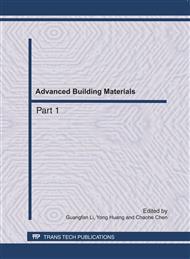p.528
p.532
p.536
p.540
p.548
p.554
p.561
p.565
p.569
Study on the Corrosion Resistance of Polymer-Modified Reactive Powder Concrete
Abstract:
In ordinary processing condition, using small amount (2%) of polymer to modify reactive powder concrete (RPC), the performance of modified and unmodified RPC was studied for their corrosion resistance with water-dip-in, acid-dip-in and sulphate solution-dip-in tests and was verified by the strength loss rate. The results show that not only the corrosion resistance but also the strength, especially the flexural strength, has been improved obviously after the polymer modification. The mechanism has been studied with SEM and EDS analysis.
Info:
Periodical:
Pages:
548-553
Citation:
Online since:
May 2011
Authors:
Price:
Сopyright:
© 2011 Trans Tech Publications Ltd. All Rights Reserved
Share:
Citation:


